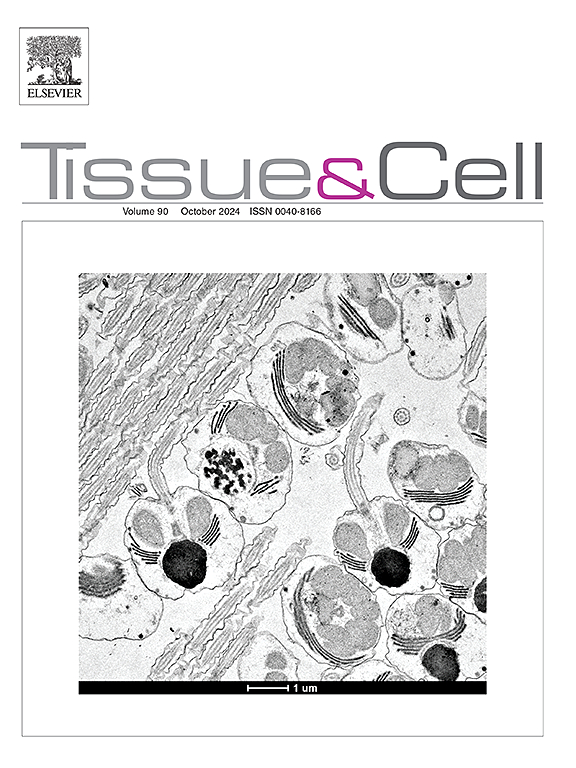Effects of L-carnitine over-supplementation on spermatogenesis and sperm function in healthy NMRI mice
IF 2.7
4区 生物学
Q1 ANATOMY & MORPHOLOGY
引用次数: 0
Abstract
L-carnitine (LC) plays a key role in lipid metabolism by transporting fatty acids from the cytosol into mitochondria for energy production. Beyond its metabolic function, LC exhibits significant antioxidant, anti-cytokine, and anti-apoptotic properties, contributing to cellular protection. This study investigates the potential adverse effects of four weeks of LC supplementation (20, 100, and 500 mg/kg body weight, n = 10) on spermatogenesis and sperm function in healthy NMRI male mice. Sperm parameters—motility, concentration, and morphology—were assessed alongside sperm and testicular oxidative status. Sperm chromatin and DNA integrity were evaluated through histone persistence (Aniline Blue staining), protamine deficiency (CMA3 staining), and DNA fragmentation (Acridine Orange staining). Pregnancy outcomes were also investigated. After four weeks, the LC500 group exhibited significantly higher liver weight than the controls. However, sperm parameters, reactive oxygen species (ROS) production, lipid peroxidation, and testicular malondialdehyde and total antioxidant capacity levels showed no significant differences among groups. Notably, the LC500 group demonstrated a significant decline in sperm DNA and chromatin integrity (P < 0.05). Alongside, liver sections from LC500-treated mice showed a marked increase in lipid droplets, while controls maintained normal hepatic morphology. Despite these alterations, male fertility indices remained unchanged. Our findings suggest that while LC is essential for metabolism, over-supplementation may compromise male fertility by inducing sperm chromatin damage and DNA fragmentation. Furthermore, high-dose LC intake may contribute to inflammation and non-alcoholic fatty liver disease (NAFLD), emphasizing the need for cautious LC supplementation to safeguard reproductive health.
过量补充左旋肉碱对健康NMRI小鼠精子发生和精子功能的影响
左旋肉碱(LC)在脂质代谢中发挥关键作用,将脂肪酸从细胞质溶胶转运到线粒体中产生能量。除了其代谢功能外,LC还具有显著的抗氧化、抗细胞因子和抗凋亡特性,有助于细胞保护。本研究调查了4周补充LC(20、100和500 mg/kg体重,n = 10)对健康NMRI雄性小鼠精子发生和精子功能的潜在不良影响。精子参数——活力、浓度和形态——与精子和睾丸氧化状态一起被评估。通过组蛋白持久性(苯胺蓝染色)、鱼精蛋白缺乏症(CMA3染色)和DNA片段化(吖啶橙染色)评估精子染色质和DNA完整性。妊娠结局也进行了调查。四周后,LC500组的肝脏重量明显高于对照组。然而,精子参数、活性氧(ROS)产生、脂质过氧化、睾丸丙二醛和总抗氧化能力水平在各组间无显著差异。值得注意的是,LC500组精子DNA和染色质完整性显著下降(P <; 0.05)。此外,lc500处理小鼠的肝脏切片显示脂滴明显增加,而对照组保持正常的肝脏形态。尽管有这些变化,但男性生育指数没有变化。我们的研究结果表明,尽管LC对新陈代谢至关重要,但过量补充LC可能会导致精子染色质损伤和DNA断裂,从而损害男性的生育能力。此外,大剂量摄入LC可能导致炎症和非酒精性脂肪性肝病(NAFLD),强调需要谨慎补充LC以保障生殖健康。
本文章由计算机程序翻译,如有差异,请以英文原文为准。
求助全文
约1分钟内获得全文
求助全文
来源期刊

Tissue & cell
医学-解剖学与形态学
CiteScore
3.90
自引率
0.00%
发文量
234
期刊介绍:
Tissue and Cell is devoted to original research on the organization of cells, subcellular and extracellular components at all levels, including the grouping and interrelations of cells in tissues and organs. The journal encourages submission of ultrastructural studies that provide novel insights into structure, function and physiology of cells and tissues, in health and disease. Bioengineering and stem cells studies focused on the description of morphological and/or histological data are also welcomed.
Studies investigating the effect of compounds and/or substances on structure of cells and tissues are generally outside the scope of this journal. For consideration, studies should contain a clear rationale on the use of (a) given substance(s), have a compelling morphological and structural focus and present novel incremental findings from previous literature.
 求助内容:
求助内容: 应助结果提醒方式:
应助结果提醒方式:


